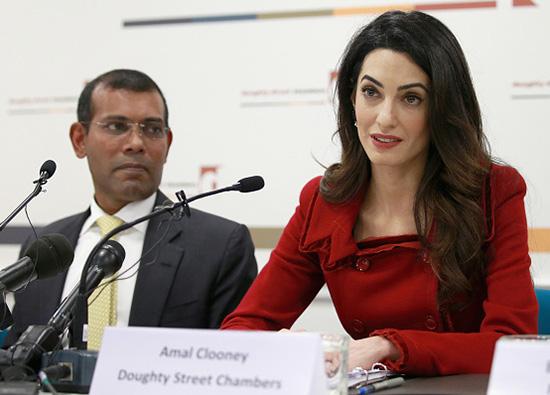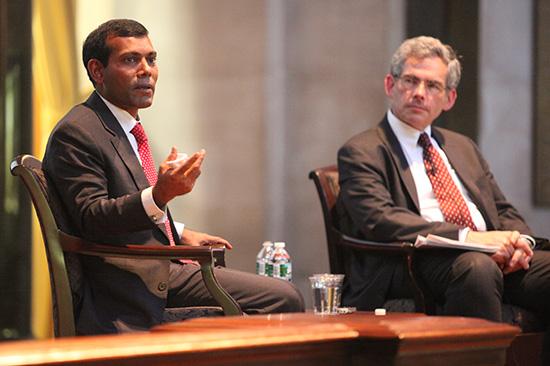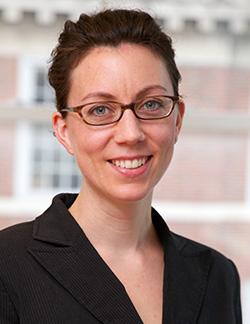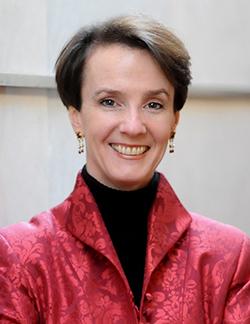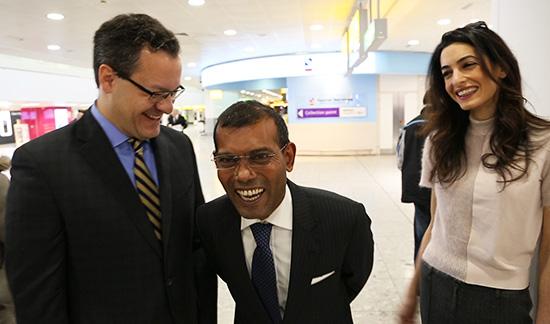From Morningside Heights to the Maldives
How International Human Rights Lawyer Amal Clooney Came to Represent Former Maldives President Mohamed Nasheed, with Help from Columbia Law School Professors and Students
New York, May 12, 2016—When former Maldives president and international climate change activist Mohamed Nasheed finally arrived in London in January, after spending almost a year in prison, few people outside of his family were as relieved as his lawyer, Columbia Law School Visiting Professor Amal Clooney.
Tense negotiations with the Maldives government had been touch-and-go until his plane was airborne, and Clooney anxiously awaited word that Nasheed, the first democratically elected president of the island nation, had been freed temporarily for medical treatment. “It was a big relief when I saw him walk down the terminal at Heathrow and give his wife Laila a big hug,” she recalled.
| Columbia Law School Visiting Professor Amal Clooney took on the case of former Maldives president and climate change activist Mohamed Nasheed (left), after he was ousted by the military and sentenced to 13 years in prison in what has been described as a politically motivated sham trial. |
For Clooney, a senior fellow at Columbia Law School’s Human Rights Institute, the wait had been long, intense, and occasionally unnerving. Aided by two Law School students working within her legal team, Kristina Ravic ’15 LL.M. and Fang Yi Liu ’16, Clooney was part of an international campaign to win freedom for Nasheed, who had been ousted by the military in 2012 and later sentenced to 13 years in prison in a politically motivated sham trial. For Nasheed, of course, the wait had been longer. His road to freedom began four years earlier at Columbia Law School—though at the time, he had no idea his visit to Morningside Heights would prove to be so fortuitous.
Behind the Scenes
Just months after Nasheed had been deposed, Columbia Law School Professor Michael B. Gerrard, director of the Sabin Center for Climate Change Law, invited him to speak at a public event co-sponsored by the Sabin Center and Columbia University’s Earth Institute. Gerrard moderated the discussion.
Gerrard had done extensive work for small island nations facing the growing humanitarian—and existential—crisis caused by rising sea levels. At the time, he was co-editing a book, Threatened Island Nations, based on a major academic conference he chaired at the Law School in 2011.
| Nasheed (left) at Columbia University in March 2012, at an event moderated by Professor Michael Gerrard (right), director of the Sabin Center for Climate Change Law, who invited the former Maldives president to speak. |
Nasheed, trained as a marine scientist in the United Kingdom, was one of the leading voices advocating for the island nations threatened by climate change. After years of political persecution, islanders elected Nasheed president of the Republic of the Maldives in 2008, ending the autocratic rule of Maumoon Abdul Gayoom, who reigned over the country’s 350,000 inhabitants for 30 years. Nasheed famously held a cabinet meeting underwater to highlight the threat of global warming to the Maldives, a chain of 26 low-lying atolls in the southern Indian Ocean. More substantively, he committed his nation to becoming carbon neutral by 2020. A documentary film about his activism, The Island President, was produced in 2011.
In November 2014, Gerrard organized a lunch with Nasheed in New York, together with Jessica Wentz ’12, associate director at the Sabin Center, and Sarah Knuckey, the Lieff Cabraser Associate Clinical Professor of Law at Columbia Law School, faculty co-director of the Human Rights Institute, and director of the Human Rights Clinic, which regularly provides support to human rights activists around the world, often advising them on legal and advocacy strategies to advance rights and environmental justice.
The group discussed human rights strategies to counter climate change, and how climate change would cause an international refugee crisis. Nasheed said wealthy nations faced a clearly inevitable choice:
“You can drastically reduce your greenhouse gas emissions so that the seas do not rise so much. Or when we show up on your shores in our boats, you can let us in. Or when we show up on your shores in our boats, you can shoot us. You pick.”
Nasheed had been planning to begin a major new international climate change campaign. But a few months later, in February 2015, he was arrested on “terrorism” charges by the Maldives military regime—now led by Gayoom’s half-brother—which had grown increasingly repressive. It had continued to harass Nasheed and derailed his attempt to regain the presidency in a 2013 election. The new terrorism charges stemmed from the arrest of an allegedly corrupt local judge during Nasheed’s time in office, and they were immediately and widely condemned as baseless by the international community.
| Sarah Knuckey, the Lieff Cabraser Associate Clinical Professor of Law, director of the Human Rights Clinic, and faculty co-director of the Human Rights Institute, suggested Clooney take up Nasheed's case. |
Knuckey recommended her Columbia Law School colleague and London-based barrister Amal Clooney to take up Nasheed's case.
London Calling
At the time of Nasheed’s arrest, Clooney was already well known for her extensive background in international litigation; she had argued cases before the International Criminal Court, the International Court of Justice, and the European Court of Human Rights, as well as before domestic courts in the U.S. and Britain. She helped to win the release of former Ukrainian Prime Minister Yulia Tymoshenko, who was regarded by the European Union as a political prisoner of the Kiev government.
At Knuckey’s suggestion, Clooney looked into Nasheed’s case, and was quickly hooked. “I started reading the file and became increasingly angry and outraged,” she said. “What happened was a clearly sham proceeding brought against someone for their political relevance and political expressions. I can tell when a case is one I’m going to be interested in—I’m underlining and highlighting things, and the margin is all exclamation points.”
Nasheed’s trial in the Maldives, Clooney said, made a mockery of due process: For example, he was denied the opportunity to call defense witnesses; there was no evidence that he ordered the judge’s arrest or knew about it in advance (the key witness testified he had simply “assumed” Nasheed was involved); and his access to counsel was severely limited. Indeed, two of the three judges involved provided evidence for the prosecution’s case.
Clooney submitted a petition to the United Nations Working Group on Arbitrary Detention, which in September ruled that Nasheed’s detention violated international law and called for his release. But the Maldives government ignored the U.N., and Clooney lobbied leaders in Washington, London, Brussels, and the U.N. to bring international pressure on the Maldives government to release Nasheed. She met with both U.K. Prime Minister David Cameron and U.S. Secretary of State John Kerry to press the case, and to raise the possibility of levying sanctions on the Maldives if the government did not respect human rights and meet its international legal obligations, including those under the International Covenant on Civil and Political Rights, which guarantees the right to due process and a fair trial. The Maldives ratified that treaty in 2006.
“The Maldives was violating treaties it had ratified,” Clooney said.
Help from Columbia Law School
For Nasheed’s case, Clooney drew on research conducted by Columbia Law School students.
| Sarah Cleveland, the Louis Henkin Professor of Human and Constitutional Rights and faculty co-director of the Human Rights Institute, with whom Clooney co-teaches a human rights class. |
The case illustrated lessons from the Columbia Law School course Clooney has co-taught for the past two years with Sarah H. Cleveland, the Louis Henkin Professor of Human and Constitutional Rights and faculty co-director of the Human Rights Institute.
“Professor Cleveland and I cover the different ways in which international law, and particularly human rights law, can be enforced at the international level,” Clooney said. “What are the U.N. mechanisms you can go to if you are denied justice in your national courts?”
“As a professor, Amal is able to bring into the class the perspective of an expert practitioner who has had high-profile and interesting cases, and she teaches these cases in the class,” said Cleveland. “She recruited Law School students to work with her last year, many of whom continued to work with her over the summer. It's an incredible opportunity for them.”
For Liu, working with Clooney was a "deeply enriching experience." "I was able to dramatically expand my knowledge and understanding of international law," he said. "It took special courage, strength of character, and compassion for Professor Clooney to advocate as vigorously as she did on behalf of President Nasheed. The case reinforced my faith that human rights law and international law can make the world a better place."
During a trip in September to meet Nasheed in prison, Clooney found the ex-president in remarkably good spirits, despite the circumstances. Just days before Clooney arrived in the Maldives, one of Nasheed’s local attorneys had been attacked and stabbed in the head. Clooney and her co-counsel, Jared Genser, were also dismayed to discover that a private conversation with Nasheed in prison appeared to have been bugged by the government.
|
Upon his arrival at London's Heathrow Airport earlier this year, Nasheed was asked by a reporter why the Maldives government had released him. Standing between his attorneys Clooney (right) and Jared Genser (left), he said he "had a great counsel," laughing at his own reply.
|
Foreign governments exerted some pressure on the Maldives regarding Nasheed’s case, as well as other political prisoners and the human rights crackdown more generally. At last November’s meeting of the 53 Commonwealth countries, Cameron pushed for a unified stance against the Maldives’ anti-democratic government. Kerry described Nasheed’s imprisonment as “an injustice that needs to be addressed soon” during a visit to Sri Lanka this past spring. “The possibility of sanctions is still alive,” Clooney said.
She believes these threats provoked the government to allow Nasheed to travel to London to seek medical attention for a back injury sustained during an earlier detention. Yet she cautions he is not out of the woods. His conviction still stands, and his future remains uncertain. “He would like to return to his country under circumstances that would allow him to participate in political life,” said Clooney, who continues to act as a legal adviser to Nasheed.
The Maldives’ next presidential election is in 2018, and Clooney notes the stakes are high. “Although we represent Nasheed as an individual, what is happening to him is emblematic of a much larger problem in the country. Every opposition leader is behind bars, and over 1,000 people are facing charges resulting from peaceful demonstrations,” she said.
“If we have a firm commitment from the international community that the Maldives government won’t be allowed to get away with flouting its legal obligations, then I think there might be room for optimism,” Clooney said. “But that depends on international partners playing their part.”
# # #
Story written by Mark Frankel, a New York-based writer and editor.
